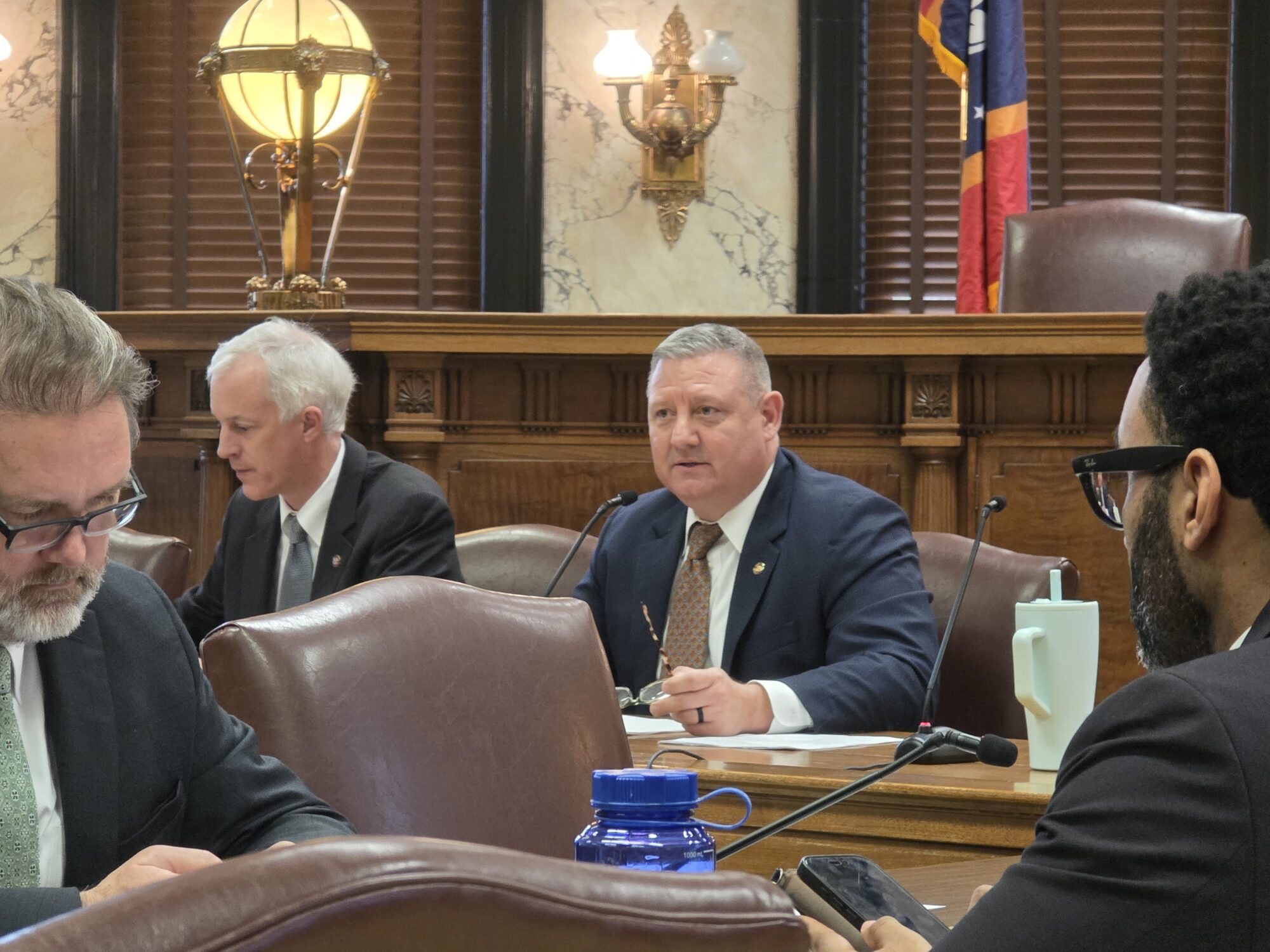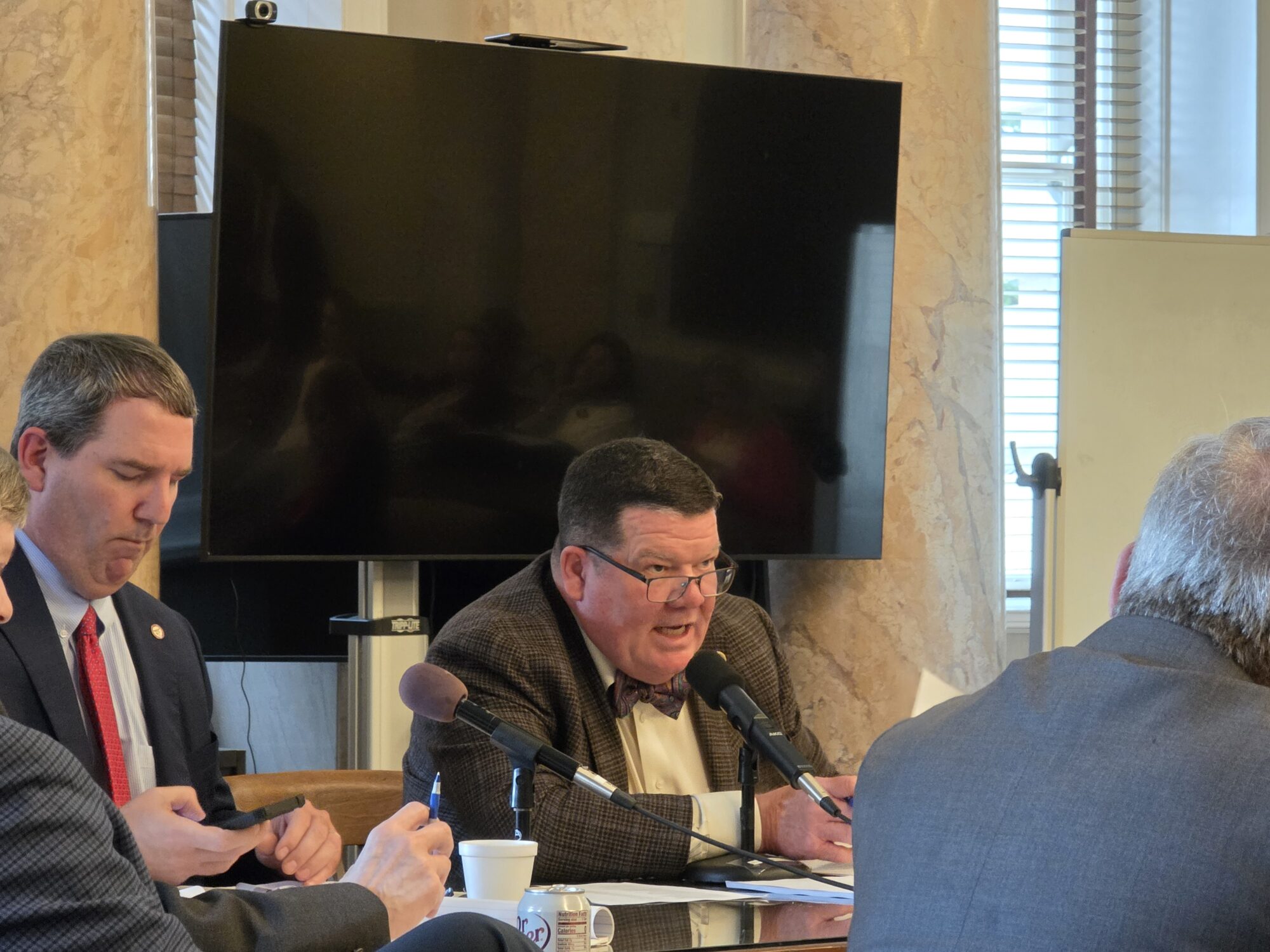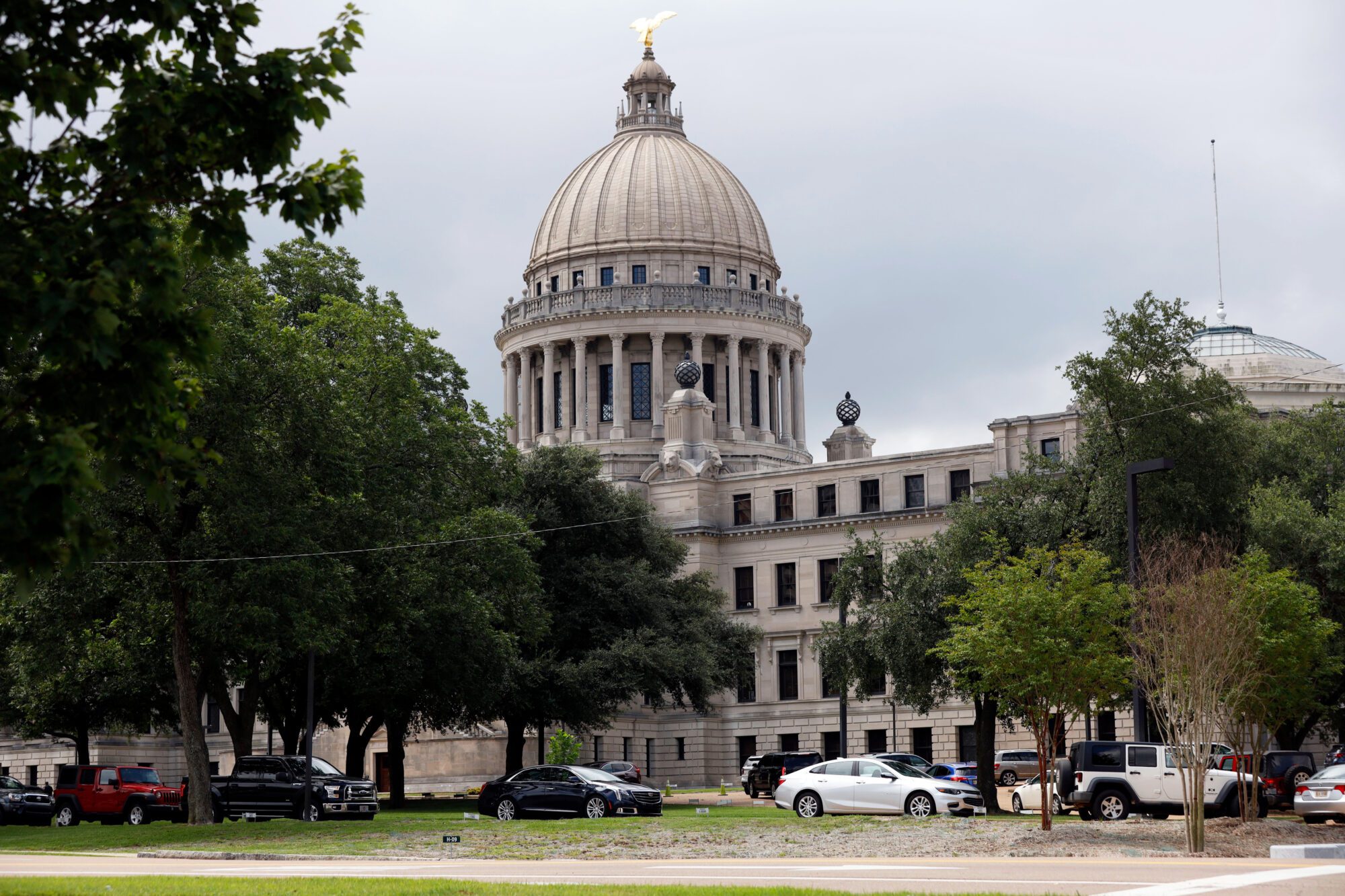
(Photo from Delta State website)
- Six of Mississippi’s eight public universities have experienced enrollment drops over the last 10 years. Yet, operating budgets and state appropriations at those institutions continue to rise.
Delta State University is taking measures to get its budget in order, but a tuition increase is not on the table.
According to a presentation to the Board of Trustees at the Mississippi Institutions of Higher Learning last month, Delta State was the only public institution in the state not to request a tuition increase for the coming year.
While Delta State is keeping tuition at $8,435, all other institutions are increasing their rates by an average of $300. Mississippi University for Women will see the largest increase of $400, to a new rate of $8,392, which is still lower than Delta State’s. The highest tuition in the state will be $10,272 at the University of Mississippi Medical Center. Those rates do not include fees for student activities, capital improvements, technology and other associated costs.
Declining Enrollment vs. Bigger Budgets
According to enrollment and budget data compiled by IHL, Delta State’s full-time equivalent enrollment (FTE) has declined by 47 percent over the last 10 years, going from 3,753 in the 2013 school year to 1,991 in the 2023 school year. The full-time equivalent enrollment is a calculation demonstrating the number of students attending a university if they were all full-time students.
While six of the state’s eight public universities have seen enrollment declines in that same period, Delta State’s decline is the highest among the group.
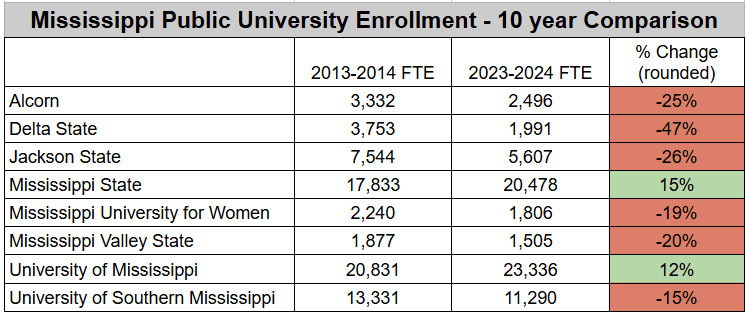
However, spending trends have not followed the drops in enrollment at any of the institutions, including Delta State.
For reference, Delta State’s operating budget for the 2014 school year was $67.8 million, $22.6 million of which came from state appropriations. For the 2023 school year, the school’s operating budget rose to $90.9 million, $41.7 million of which was from state appropriations. This represents an operating budget increase of 34 percent and state appropriation increases of 85 percent during the 10-year period.
A similar trend can be seen for those universities with declining enrollment. None of Mississippi’s eight public colleges and universities saw a reduction in operating budgets or state appropriations as student populations declined.
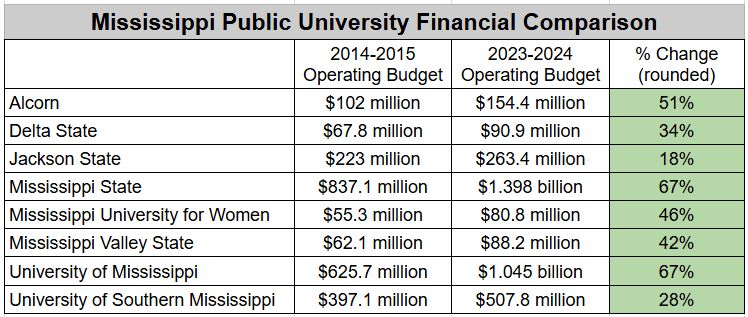
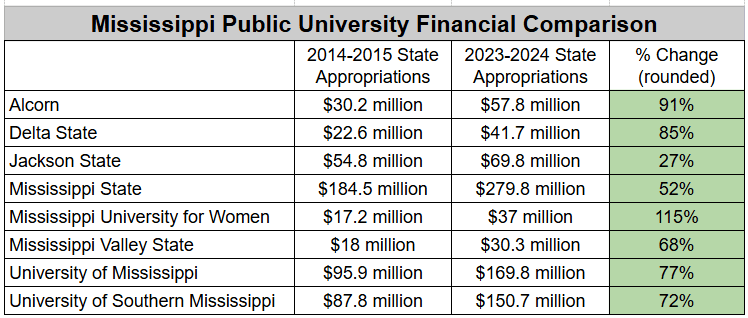
Year-to-year state appropriations can fluctuate due to one-time expenditures.
Why No Tuition Increase Request
Delta State President Dr. Daniel Ennis said a tuition increase would have diminished the university’s competitiveness. The university is keeping dorm rates level for the coming fiscal year, as well.
In order to maintain tuition and board, Ennis said some budget cut proposals were sent to the IHL Board for consideration. The proposed cuts include 17 staff positions, but faculty would not be affected until low-performing degree programs are phased out in the coming years.
To that end, the administration is currently reviewing low-performing degree programs to determine which ones may need to be dropped, consolidated, or changed.
The proposed changes are expected to be considered by the IHL Board during their June 20th meeting. Dr. Ennis believes the Board will approve the proposal.

Ennis explained that the programs most likely to be affected are those with single-digit enrollment and those that struggle to produce graduates.
“For me, it certainly is a case where we looked at where students basically are voting with their feet,” Dr. Ennis said. “What programs are students going to, and unfortunately some programs are losing appeal to students.”
Programs that are anticipated to be impacted will be in the areas of arts and sciences, such as majors in English, history, music and art.
“But we’re replacing those programs with interdisciplinary degrees that will still cover those areas. So rather than having a separate art and music degree, we will have a combined music and performing arts degree. Instead of having an English and history degree, we will have a combined humanities and social sciences degree,” Ennis elaborated.
Cuts will be made carefully to ensure alternatives are still offered at Delta State, including teacher licensure degree paths.
“We looked at our education programs and realized we could still offer teacher licensures with far fewer degree programs,” Dr. Ennis said. “So, if you came here to get a teaching license, we’ll still be able to do that when we get our new degrees in place.”
Students who have 60 credit hours or more accrued in an affected degree path will continue to be able to complete it.
“We have a teach-out program. You don’t want to leave our juniors and seniors high and dry who are near a degree,” Ennis said. “We’re going to support them.”
Freshmen and sophomores will be able to choose from new degree paths that suit their goals. If a student decides to transfer to another institution, Delta State personnel will assist them with finding an institution that meets their needs. But Dr. Ennis is confident Delta State will retain a majority of its students during the transition.
Once all of the proposed faculty cuts are in place, as programs are phased out in the coming years, Ennis said the university will save roughly $1.5 million out of $37.8 million payroll over two years. The payroll 10 years ago was $32.5 million. There is also a proposed cut to the university’s administration that will provide another $1 million in savings.
“That gets us to a stable budget for Delta State,” Ennis said.
He added that the goal is to continue to provide a quality education that meets the needs of budget-conscious families.
All of the proposed adjustments at Delta State are being made to compensate for the enrollment cliff occurring across the state, Dr. Ennis said.
Even with the rate hikes at most institutions in the state, IHL Senior Associate Commissioner of Finance Dr. John Pearce informed the Board that tuition in Mississippi remains lower on average than those in neighboring states, except one.
“For the first time in my memory we have surpassed Arkansas, but we’re basically on parity with where Arkansas is at. Our neighboring states, Alabama, Tennessee and Louisiana, continue to be significantly higher,” Pearce explained.
He added that salaries at higher institutions in Mississippi remain 10 percent less than those in neighboring states, in spite of legislative appropriation increases.
“We’ve gotten a little bit of an increase each year for salaries. But I think the problem is that the target keeps moving, so while we’re making progress, other states are making progress as well,” Pearce added.
Time to Consider Closures?
As previously reported, Mississippi Department of Education data shows K-12 enrollment is on the decline in the Magnolia State. Since the 2019-2020 school year, there are nearly 30,000 less students in Mississippi public school classrooms.
Fewer high school students means fewer potential college students.
READ MORE: Can Mississippi Continue to Support Eight Public Universities?
Due to that enrollment cliff, SB 2726 was introduced during this year’s legislative session by State Senator John Polk (R), but it did not make it out of committee. The mention of the legislation drew backlash from various corners of the state.
Had it become law, the bill would have prompted the IHL Board of Trustees to choose three of the state’s eight public universities for closure.
Senator Polk told Magnolia Tribune last week that he plans to introduce similar legislation for consideration next session.
“I feel like we’ve got to close at least three to give the other five a chance,” Polk said.

